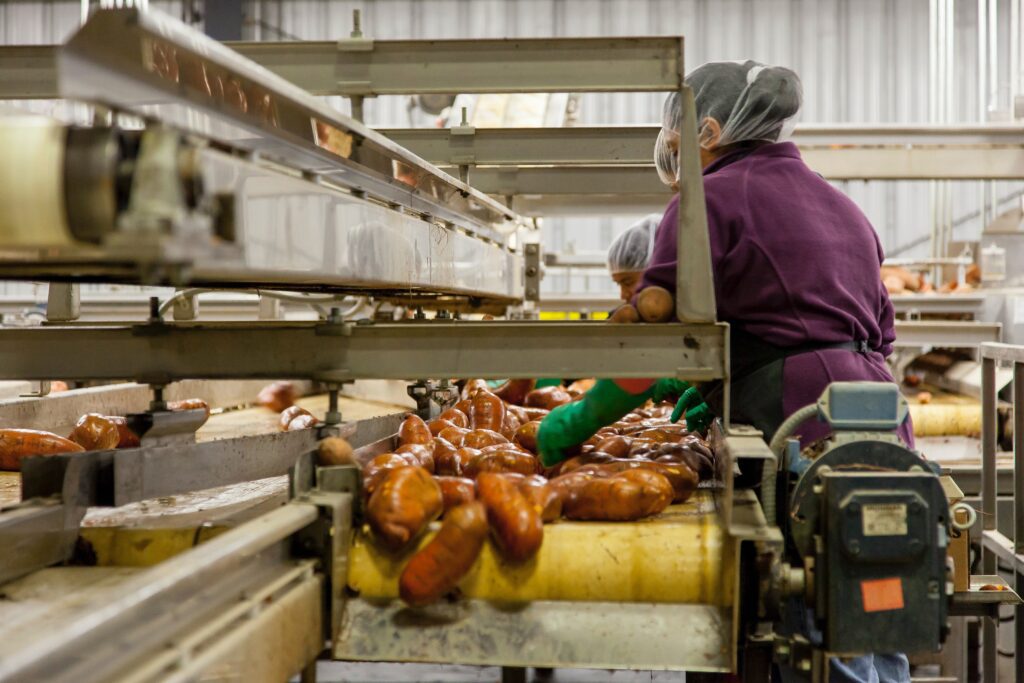Food Processing Industry
Introduction/ Meaning of Food processing
Food processing is the process of transforming raw crops or clean animal products into food. This process makes them suitable for long shelf life that are highly marketable. This industry is categorized as the sunset sector in the second decade of 21st century.
In developed countries, around 80 per cent of the harvest is processed into value added and increased shelf life products. Farmers in India, by and large, produce crops for fresh consumption rather than processing. However, in recent years, farmers have begun to produce crop varieties suited for food processing. Food processing sector in India is in it’s infancy. Presently, it has a dualistic structure, organized and unorganized.
Methods of processing used by the Food processing Industry
- Washing
- Chopping
- Pasteurising
- Freezing
- Fermenting
- Packaging
- Cooking
- Other traditional methods like heat treatment, pickling, smoking, drying
- Other modern methods like ultra-heat treatment, high pressure processing or modified atmosphere packaging.
Components of Food processing Industry / Products of Food processing Industry
- Milk and milk products
- Meat and meat products
- Fish and marine products
- Poultry, eggs and related products
- Cereals
- Grains and oilseeds
- Fruits and vegetables
- Confectioneries (Bread, biscuits, chocolates etc)
- Beverages ( Coffee, tea, cocoa, aerated water/ drinks )
- Alcoholic beverages (beer, wine and liquor )
- Packaged food
Importance of Food processing Industry in India
- Enhances the shelf life of food: Food processing helps extend the shelf life of perishable products like fruits and vegetables, which reduces food wastage and improves access to healthy and nutritious food.
- Increases the value of food products: Processing can increase the value of food products by adding value-added services like packaging, branding, and labeling. This helps farmers and producers get better prices for their produce and improve their livelihoods.
- Creates employment opportunities: The food processing industry provides employment to millions of people, directly and indirectly. It creates jobs in the agricultural sector, in processing plants, and in the distribution and retail sectors.
- Boosts the economy: The food processing industry contributes significantly to the country’s GDP. It also generates foreign exchange through exports of processed food products.
- Enhances food security: Food processing helps improve the overall food security of the country by increasing the availability of safe and nutritious food products. It also helps reduce dependence on imports and ensures a consistent supply of food throughout the year.
Problems faced by Food processing Industry
- Lack of infrastructure: The food processing industry in India lacks adequate infrastructure facilities such as cold chain networks, storage facilities, and transportation systems. This leads to a high level of wastage and spoilage of perishable foods, resulting in significant financial losses.
- Limited access to finance: Many small and medium-sized enterprises in the food processing industry face challenges in accessing finance for expansion and modernization. This limits their ability to invest in new technologies and improve their operational efficiency.
- Poor quality control: The food processing industry in India often faces issues with quality control and food safety standards. This is due to inadequate regulations and inadequate implementation of these regulations.
- High cost of raw materials: The food processing industry in India faces high costs for raw materials due to the lack of availability of quality raw materials, as well as the high cost of transportation and storage. This makes it difficult for food processing companies to maintain profitability and compete with international players.
- Limited access to global markets: Indian food processing companies often face challenges in accessing global markets due to stringent import regulations and the lack of recognition of Indian food standards by foreign countries. This limits their ability to expand and grow their businesses.
Potential of Food processing Industry
- Increasing Urbanization
- Increase in spending on ready to eat food products and change in consumption patterns
- Changing demographics – Rise in disposable incomes
- Increasing nuclear families and working women
- Demand for functional foods/ nutraceutical foods
- Growth of organized retail and private label penetration
Conclusion
With higher income, urbanisation, demographic shifts, improved transportation and changed consumer perceptions regarding quality and safety , food consumption patterns have changed over the years. Further, advertising through mass media/social media is also found to have led to higher demand for processed foods. There is an increase in awareness about health and wellness, high protein, low fat, wholegrain, traditional foods and organic food products leading to increasing demand of Indian nutraceutical products.
With sound policy environment and increasing interest of corporates in agro-food processing, it can scale to great heights.
Food Processing Industry
ALSO READ : SUSTAINABLE LIVING
ALSO READ : INDIAN CBDC

